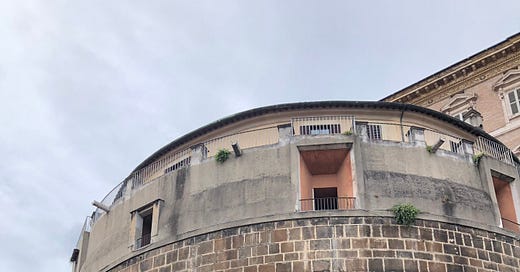The court of appeal in Vatican City has upheld the conviction of the former director of a Vatican bank, bringing a years-long legal process to a close.
The decision, handed down by judges on Thursday, confirms the conviction last year of Angelo Caloia, who led the Institute for Works of Religion — often called the Vatican Bank — for 20 years. He was found guilty on charges of corruption and embezzlement. The decision ends his legal appeal.
Caloia led the bank until 2009. He was found guilty of using his position to sell parts of the IOR’s property portfolio to himself and to his personal lawyer, Gabriele Liuzzo, and Liuzzo’s son, at reduced prices, masking the transactions through a series of offshore holding companies.
The Liuzzos were also convicted by the Vatican court last year, and had their appeals rejected on Thursday.
The IOR functions as the Vatican’s commercial and retail bank, taking deposits and holding accounts for religious orders and institutions around the world, as well as for individuals living or working in Vatican City. It also makes loans and extends credit for commercial transactions by religious institutions and some departments of the Roman curia.
Because the IOR is in Vatican City, its accounts are not subject to taxation and other regulations imposed by other countries, making it a target for abuse by money launderers. After decades of scandals, cleaning up the bank has been seen as a key marker of progress in Vatican financial reform.
The current president of the IOR is Jean-Baptiste de Franssu, under whose leadership the bank triggered a sprawling investigation into the financial dealings of the Vatican Secretariat of State, after its top officers complained to Pope Francis about a suspicious loan application from the secretariat.
That investigation led to the ongoing trial of 10 individuals for financial crimes in the Vatican.
In its most recent report on Vatican financial institutions, the Council of Europe’s anti-money laundering watchdog Moneyval offered a broadly positive assessment of the bank, concluding that it “has a sound understanding of its money laundering and financing of terrorism risks,” the watchdog said.
“In general, customer due diligence (CDD) and record-keeping obligations have been applied diligently and there is a rigorous risk-based transaction monitoring programme that requires the collection of information and documentation as necessary throughout the course of a business relationship.”
The court’s decision to uphold Caloia’s conviction is a landmark win for the Vatican’s Office of the Promoter of Justice; Moneyval’s report had also expressed concern at prosecutors’ failure to secure convictions for financial crimes, or impose effective penalties on financial criminals.
Caloia will be the first person convicted of financial crimes in the Vatican to serve a custodial sentence. Under the terms of diplomatic treaties between the Holy See and the Italian Republic, individuals sentenced to prison by Vatican courts serve their time in Italian prisons.
The lead prosecutor in Caloia’s case, Alessandro Diddi, is also responsible for pressing charges in the ongoing trial concerning the Secretariat of State, including against the former sostituto Cardinal Angelo Becciu.
Hearings in that trial are set to resume in September.











